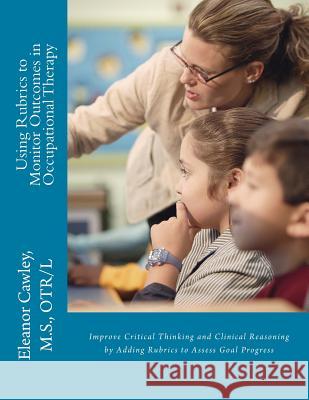Using Rubrics to Monitor Outcomes in Occupational Therapy: Improve Critical Thinking and Clinical Reasoning by Adding Rubrics to Assess Goal Progress » książka
Using Rubrics to Monitor Outcomes in Occupational Therapy: Improve Critical Thinking and Clinical Reasoning by Adding Rubrics to Assess Goal Progress
ISBN-13: 9780615809021 / Angielski / Miękka / 2013 / 74 str.
Using Rubrics to Monitor Outcomes in Occupational Therapy: Improve Critical Thinking and Clinical Reasoning by Adding Rubrics to Assess Goal Progress
ISBN-13: 9780615809021 / Angielski / Miękka / 2013 / 74 str.
(netto: 115,41 VAT: 5%)
Najniższa cena z 30 dni: 119,53
ok. 16-18 dni roboczych.
Darmowa dostawa!
Every practice setting that an occupational therapist, or any other health care provider, works in is demanding accountability and transparency. School-based practice is not immune, gone are the days of a teacher's or therapist's opinion. Reports are now required to be a balanced assessment of a student's abilities, strengths and weakness including both formative and summative data. Occupational therapists need to know how to meet the demands of today's data driven environment. As a research emergent profession, we are called upon to take data systematically. In an educational environment, occupational therapists should be aligning their data collection methods and documentation style with teachers. By aligning our documentation style and data collection methods, a more cohesive picture of the student emerges. This allows for more concise development of the IEP and goals targeted toward the student's individual needs. Data collection need not be difficult. With a little preparation and smart organization planning, data collection becomes easy. When annual review time comes around, goal progress is also easy to report. This allows better planning for the coming year by the Committee on Special Education. Students also benefit by using rubrics in an occupational therapy setting. Some students cannot see or understand the "hidden curriculum." These students need the guidelines for achievement that others may not. In using a rubric, you are defining the rules by which you consider a goal achieved. This can potentially improve goal progress and decrease the student's anxiety about being pulled out or having a therapist in the classroom. For some students, a rubric provides the light at the end of the tunnel. With systematic data collection through the use of rubrics, occupational therapists have a unique opportunity to review and interpret the data collected from his or her students to create pilot or ex post facto studies. This can potentially lead to further research. Rubrics can be a win-win situation.











